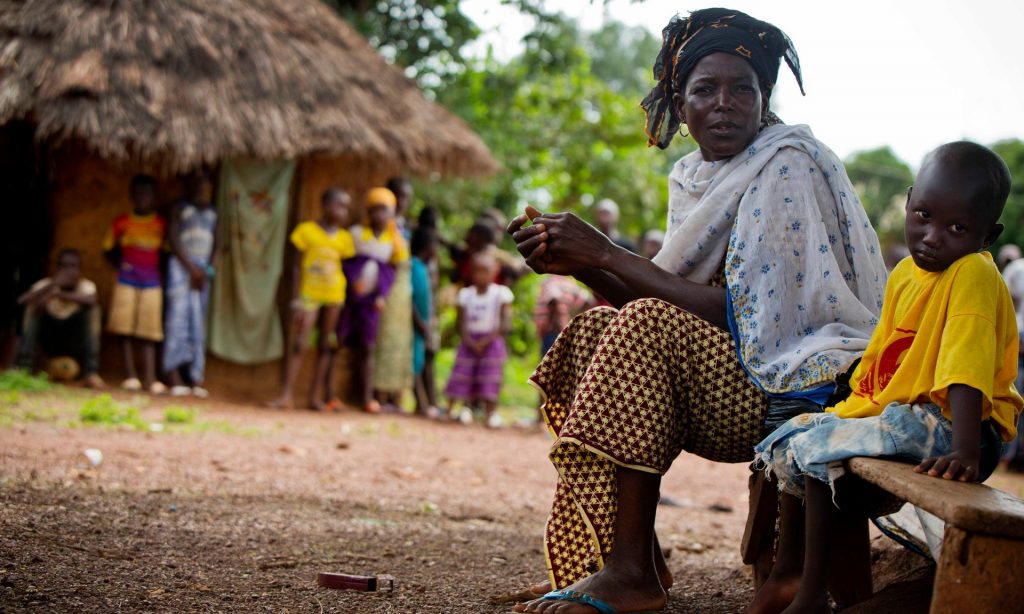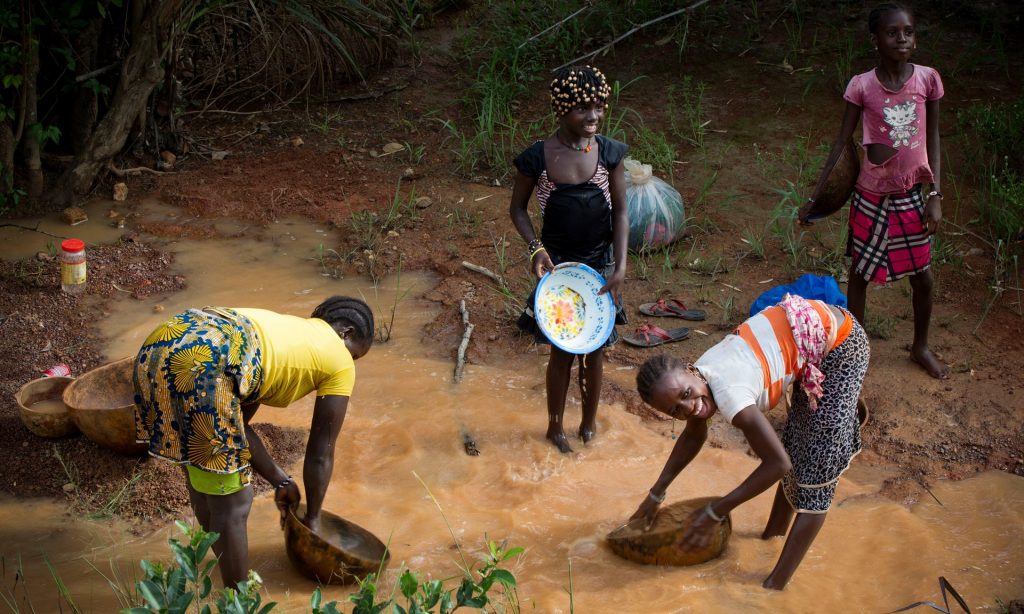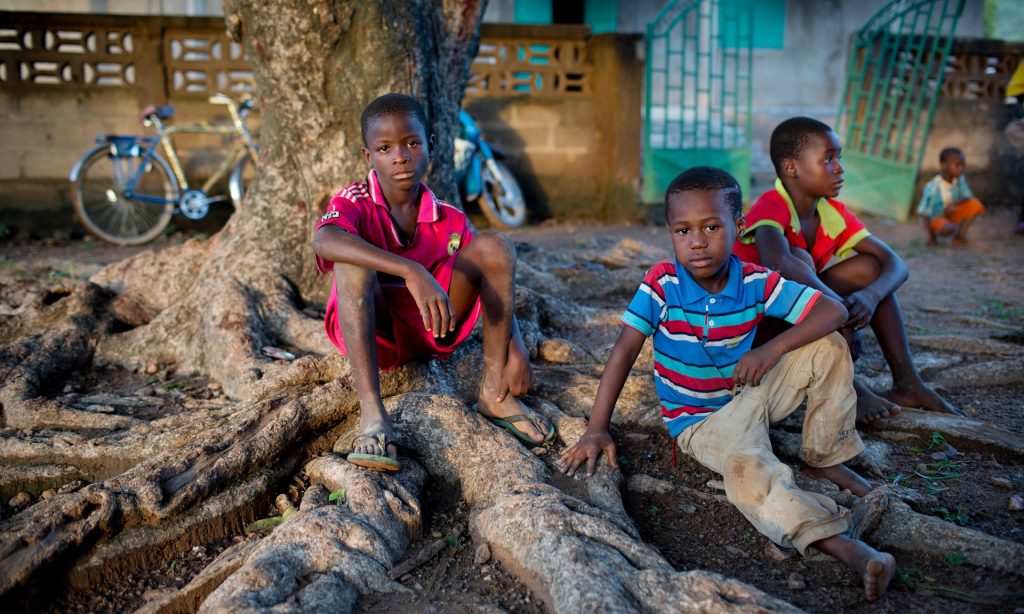
Photograph: Kate Holt/Unicef
ife on an informal gold mine is hard for any child. In Guinea, it means searching through piles of dark earth for glittering particles from a young age, going hungry if the family has no luck that day, and surviving violent attacks by other miners or the authorities.
For Lounceny, a dark-eyed boy who has spent the first four years of his life watching his mother look for gold in Kintinian in the country’s north-east, life is harder. He caught polio when he was two.
“It started with a wound on his foot,” says Lounceny’s grandmother, Sita Aidara, touching her frightened grandson’s shoulder as he sits on a wooden bench beside her, trying to keep him calm. “He started complaining about his leg – then it spread to the other one.”
She took him to a clinic 20 miles away, where it was confirmed that he had become one of the few children in Africa to contract polio. There was little they could do for him, and now Lounceny cannot walk. His family has to carry him to the mines, where he sits on a mat all day as they search.
On Thursday, Africa was set to celebrate two years with no new cases of wild polio, a major step on the way to consigning cases like Lounceny’s to the past. However, the global fight to eradicate the disease suffered a blow when two new cases were found in Nigeria.
Globally, hundreds of thousands of children used to become paralysed as a result of polio every year, before vaccines were developed in the 1950s and 1960s. While it was almost eliminated in rich countries, the problem endured in poorer states. The Global Polio Eradication Initiative, set up in 1988 by Rotary International, the World Health Organisation (WHO), Unicef and the Centers for Disease Control and Prevention (CDC), has now almost managed to eradicate the disease.
When Nigeria marked two years without any new cases last month, Afghanistan and Pakistan were thought to be the last countries in the world left where polio is endemic. However, Nigeria’s celebrations were premature. The WHO said the strain of polio discovered there is most closely linked to one last seen in Borno in 2011. The two children have become paralysed.
Nigeria’s minister of health, Isaac Adewole, put the latest occurrence down to the “insurgents’ eclipse”, referring to the fact that the terrorist group Boko Haram controlled large swathes of territory in Borno state, where the polio cases were found. Health workers could not get there and vaccinate children for months.

Photograph: Kate Holt/Unicef
“Mr President himself, when we had a meeting last week, observed that as we liberate more areas, we should expect challenges,” Adewole told Nigerian media. “But we did not expect that there would be polio. We were expecting nutrition and other problems.
“It wasn’t that we were not doing the job. A chunk of the state was out of reach, and we couldn’t reach children there.”
Nigeria had appeared to be losing the battle against the disease, with some states banning all vaccines in 2003 amid suspicions about their safety. There were also several attacks on people administering vaccines. However, an immunisation campaign led by the CDC vastly improved the situation.
Africa needs three years with no new cases to be declared officially polio-free. The Nigeria outbreak resets the clock.
Guinea, one of the poorest countries in Africa, ranked 182nd out of the 188 countries in the UN’s 2015 human development index, had its last big outbreak of wild polio in 2009, when there were 41 cases.
But a new outbreak of vaccine-derived polio hit in September 2015, after the crippling Ebola outbreak that diverted all Guinea’s healthcare efforts. Seven children under five contracted the virus in the eastern region of Kankan.
“At that moment the Ebola outbreak hit, so we couldn’t do anything,” said Souley Lalibou, leader of the WHO’s polio response in Guinea. “While Ebola was happening, everything else stopped.”

Photograph: Kate Holt/Unicef
As soon as they could, the WHO, Unicef and the government launched a campaign to stamp it out. In two weeks, Lalibou will find out whether their efforts paid off and Guinea’s polio outbreak is officially over.
“There are probably more cases out there that we don’t know about, but I don’t think there are any wild cases,” Lalibou said.
Vaccine-derived polio is easier to control than wild polio, but the effect on a child’s life is the same.
Lounceny only had one dose of the polio vaccine. Aidara wished she had known the risk to her grandson, as she would have tried to get him the 20 miles to the clinic for his second dose.
“His mother was in the mines, trying to earn money so we could eat. We didn’t know he could get polio,” she said.
As it is, the whole family struggles to survive at the same time as looking after a child with disabilities.
“The problem we have is that if you don’t carry him, he can’t move,” Aidara said. “You always have to help him. Taking care of him and looking for gold don’t go together. I’m really worried about his future – I don’t know what it will be like.”

